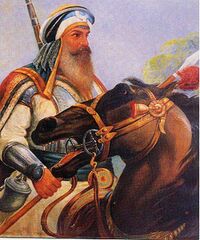Baghel Singh Dhaliwal

Baghel Singh Dhaliwal (1730? - 1802) was an important military general in turbulent times of Eighteenth century Punjab. He was born in village Jhabal, about 20 km outside of Amritsar city and grew up to become leader of the Karor Singhia Sikh fighting order or Misl. Several dozen Misls had sprung up in country side, which filled the power vacuum after decline of once formidable Mughal Empire.His Native village was Rauke Kalan in Moga District
Expansion
After establishing his military grip over part of the cis-Sutlej Punjab, Baghel Singh Dhaliwal began to raid and loot parts of trans-Yamuna territories like Meerut, Saharanpur, Shahdra and Awadh, at the behest of his Afghan allies such as Zabita Khan and Ghulam Qadir.
Attack on Delhi
In March 1776, Baghel Singh's forces were defeated by imperial Army of Mughal emperor, Shah Alam II near Muzaffarnagar. The Sikh forces had joined with those of Zabita Khan to march on Delhi but found the Mughals too strong. Further afield at Panipat, they tried joining battle but after several hours of hard struggle had to sue for peace terms. In late 1778, The Sikhs revolted and defeated the Mughal faujdar of Sirhind, Maulah Ahmad Dad, killing him and driving back Mughal forces. The Sikhs then raided further east all the way up to Delhi whose suburbs were sacked.
Battle of Ghanaur
Angered by the impertinence of vassals, the Mughal emperor Shah Alam II sent a Mughal army of 20,000 soldiers to chastise the Sikhs. A year earlier these same had begged for and been granted mercy by the emperor. The Mughal force was commanded by the wazir Nawab Majad ud Daula under the banner of the crown prince. What is less well known was that it was the wazir himself who had encouraged the Sikhs to carry out these raids in the hope of disgracing his rival Mirza Najaf Khan. The Mughals reached Karnal and there the wazir opened negotiations with the Sikhs in the hope of marching on Delhi together. Very much like what Mir Jaffer had done to his commander Siraj ud Daula at Plassey, the wazir moved his troops -- the main fighting force -- out from the imperial camp. The resulting battle led to a fighting retreat back to Mughal lines. Thus Baghel Singh's forces defeated an estimated 6,000 to 7,000 strong Mughal army in the battle of Ghanaur, near Patiala city.
It is unclear why Sikh sources believe the former battle to be a huge success since the main Mughal force was already out of the battle. The defeat of the small Mughal force was nevertheless a matter of prestige for the Sikhs. When Mirza Najaf Khan took the field in early 1779 the Mughals dictated peace terms to the Sikhs. Some Sikh sources claim that the Mughal forces at Ghanaur numbered 100,000 but this is unlikely since the whole of the Mughal strength in those twilight years of Mughal rule numbered 85,000 to 90,000 and remained more or less intact till the death of their commander in chief Mirza Najaf Khan in April 1782.
Rise of Sikh Power
The Sikhs however remained a source of trouble throughout the late 18th century, frequently supported by treasonous elements within the mughal government or by enemies. With the Mirza dead, Baghel Singh Dhaliwal was able to lead the Sikhs all the way to Delhi and in 1783 plundered the imperial capital, a move that alarmed the British as well as the Marhattas. The 1783 plunder of Delhi announced to the world that the Sikhs had arrived. A new power in the east was awakening.
He signed a treaty of friendship with the powerful Maratha Sardar Mahadji Sindhia but in concert with the other Sikh robbers of the cis Sutlej Malwa region proved traitor at each and every opportunity only being afraid to face the disciplined regiments of the Marathas in open battle.
Despite the treaty with the Marathas the same Sikhs of Malwa very quickly joined the British in the second Anglo Maratha war of 1803-1805
[1]. Baghel Singh established an octroi post in Chandni Chowk outside the Red Fort in Mughal capital Delhi in March 1783.
Baghel Singh Dhaliwal is credited with establishment of following Gurudwaras or Sikh Temples in Delhi:
- Gurdwara Mata Sundri.
- Gurdwara Bangla Sahib, Delhi.
- Gurdwara Bala Sahib, Delhi.
- Gurdwara Rakab Ganj, Delhi.
- Gurdwara Sis Ganj, Delhi.
- Gurdwara Moti Bagh, Delhi.
- Gurdwara Majnu Ka Tilla, Delhi.
Baghel Singh Dhaliwal died around 1802 at Hariana, near Hoshiarpur.
See also
External links
- News article on General Baghel Singh Dhaliwal
- Biography on sikh-history.com
- http://www.worldwideschool.org/library/books/hst/asian/TheFalloftheMoghulEmpireofHindustan/chap10.html
Back to Military Services

